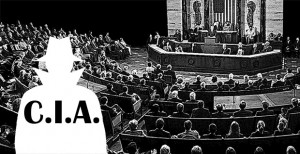Alleged CIA spying reveals government hypocrisy
Edward Snowden showed the world what happens when the government spies on its constituents. And Tuesday, California Senator Dianne Feinstein, head of the Senate Intelligence Committee, showed the world what happens when the government spies on those who govern.
Feinstein alleged on the Senate floor that during an investigation by the Senate Intelligence Committee of the CIA’s past use of enhanced interrogation techniques such as waterboarding, CIA agents searched a computer drive used by Senate staffers in preparation for that investigation.
The outcome of the investigation is a more than 6,000-page report that examines the CIA’s controversial use of enhanced interrogation techniques following the 9/11 terrorist attacks. To add fuel to the fire, the CIA has alleged that Senate staffers — who were given clearance to access more than 6.2 million classified records when compiling the report — broke the law by accessing and copying documents they should not have had access to, according to the Washington Post.
The CIA’s counterattack, spearheaded by CIA General Counsel Robert Eatinger, is a blatant attempt to deflect attention from the real story. Feinstein said the documents that are the subject of the uproar were accessed using a search tool that the CIA gave to staffers to help them sift through information. The CIA has since sought to prevent the report from being declassified.
First and foremost, the report should be declassified. If nothing else, both the 300-page condensed version and the CIA’s report submitted in refutation should be released. That action requires leadership and pressure from the Obama administration, which should be a no-brainer given the fact that President Barack Obama already supports declassification of the report. Unless the CIA can prove a national security threat might arise from revelations that they engaged in illegal practices, the American people should have access to them.
Additionally, if allegations that the CIA scoured the server of Congressional researchers are true, such conduct would be a gross breach of governmental boundaries and would add fuel to the already burning fire around the actions of the National Security Agency. Such actions would not only be in violation of the Constitution’s protection from unreasonable search and seizure, but would also violate several computer fraud and abuse laws as well as a direct presidential order.
Most Americans are willing to tolerate the clandestine actions of the CIA, whose past shadiness stretches from a plot to assassinate Fidel Castro in the 1970s to the 1980 Contra wars in Central America. The line should be drawn at domestic surveillance of elected leaders.
In typical CIA fashion, director John Brennan has denied all accusations.
“As far as the allegations of CIA hacking into Senate computers — nothing could be further from the truth. We wouldn’t do that. I mean that’s, that’s, that’s just beyond the scope of reason,” Brennan told the Council on Foreign Relations.
Doing things beyond the scope of reason is well within the CIA’s repertoire — let’s not forget why the report in question was written in the first place. In 2005, when the Intelligence Committee sought information on the CIA’s use of detention and use of enhanced interrogation techniques, the CIA destroyed several key pieces of evidence, including videotapes, that substantiated the claim that enhanced interrogation was being used.
Whatever the outcome, Feinstein’s speech also begs the question of whose answer reflects poorly on all of Congress, including Feinstein herself. Why does it take the CIA spying on the Senate for legislators to actually wake up and call out the government? When the NSA was accused of tapping German Chancellor Angela Merkel’s cell phone, no one lifted a finger. When the NSA lifted Verizon phone records for millions of Americans, Feinstein was one of the first to defend the controversial actions. But when it comes to the CIA searching a hard drive, it’s an about face:
“I have asked for an apology and a recognition that this CIA search of computers used by its oversight committee was inappropriate,” Feinstein said. “I have received neither.”
If Feinstein deserves an apology for the actions of the CIA in searching a single hard drive, so should the millions of Americans whose phone calls have been listened to by the NSA. Paradoxically, Feinstein has been one of the NSA’s biggest defenders, most recently at a dinner in Century City, Calif., hosted by the Pacific Council on International Policy.
This borders on hypocrisy; Feinstein’s actions reveal despicable government overreach, but they are also a reminder that we shouldn’t wait until an abuse of power effects us personally before we take action to defend against it. If Congress deserves to be protected from government spying, than so does the rest of the United States.
Nathaniel Haas is a sophomore majoring in economics and political science. His column, “State of the Union,” runs Thursdays.


